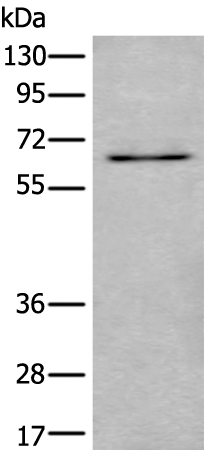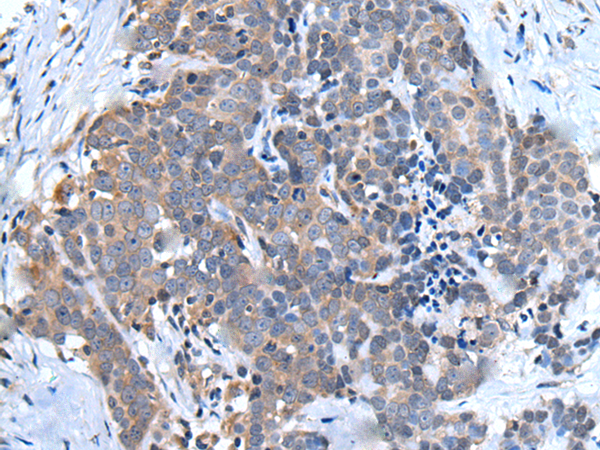

| WB | 咨询技术 | Human,Mouse,Rat |
| IF | 咨询技术 | Human,Mouse,Rat |
| IHC | 1/30-1/150 | Human,Mouse,Rat |
| ICC | 技术咨询 | Human,Mouse,Rat |
| FCM | 咨询技术 | Human,Mouse,Rat |
| Elisa | 1/5000-1/10000 | Human,Mouse,Rat |
| Aliases | DSK2; ALS15; CHAP1; N4BP4; PLIC2; HRIHFB2157 |
| WB Predicted band size | 66 kDa |
| Host/Isotype | Rabbit IgG |
| Antibody Type | Primary antibody |
| Storage | Store at 4°C short term. Aliquot and store at -20°C long term. Avoid freeze/thaw cycles. |
| Species Reactivity | Human, Mouse |
| Immunogen | Synthetic peptide of human UBQLN2 |
| Formulation | Purified antibody in PBS with 0.05% sodium azide and 50% glycerol. |
+ +
以下是关于UBQLN2抗体的3篇参考文献及其摘要概括:
---
1. **文献名称**: *Mutations in UBQLN2 cause dominant X-linked juvenile and adult-onset ALS and ALS/dementia*
**作者**: Deng, H.X., et al.
**摘要**: 该研究首次报道了UBQLN2基因突变与家族性肌萎缩侧索硬化症(ALS)和ALS/痴呆的相关性。通过生成特异性UBQLN2抗体,研究者发现突变蛋白在患者神经元中异常聚集,并揭示了其通过泛素-蛋白酶体系统功能障碍导致神经退化的机制。
---
2. **文献名称**: *Comparative analysis of UBQLN2 antibodies in neurodegenerative proteinopathy diagnostics*
**作者**: Williams, K.L., et al.
**摘要**: 本文比较了多种商业UBQLN2抗体在免疫组化(IHC)和免疫印迹(WB)中的特异性与敏感性。研究发现部分抗体在检测病理样本(如额颞叶痴呆患者脑组织)中的UBQLN2包涵体时表现优异,为临床诊断提供了实验依据。
---
3. **文献名称**: *Ubiquilin-2 immunoreactivity in TDP-43 proteinopathies of frontotemporal lobar degeneration and motor neuron disease*
**作者**: Mori, F., et al.
**摘要**: 利用UBQLN2抗体对额颞叶变性(FTLD)和运动神经元病(MND)患者的脑组织进行分析,发现UBQLN2与TDP-43病理存在共定位现象,提示其在蛋白质错误折叠和清除中的潜在作用。
---
4. **文献名称**: *Staging disease severity in UBQLN2-related neurodegeneration using antibody-based biomarkers*
**作者**: Brettschneider, J., et al.
**摘要**: 研究通过UBQLN2抗体检测患者脑脊液和脑组织样本,提出UBQLN2的病理积累程度与疾病进展阶段显著相关,为评估神经退行性疾病的严重程度提供了新型生物标志物。
---
以上文献涵盖了UBQLN2抗体在基因突变机制研究、诊断工具开发、病理共定位分析及疾病分期评估中的应用。
×